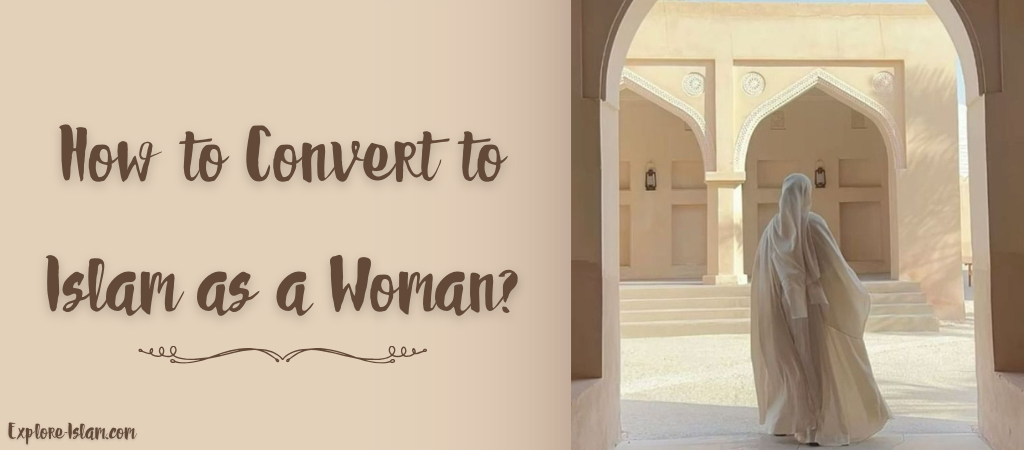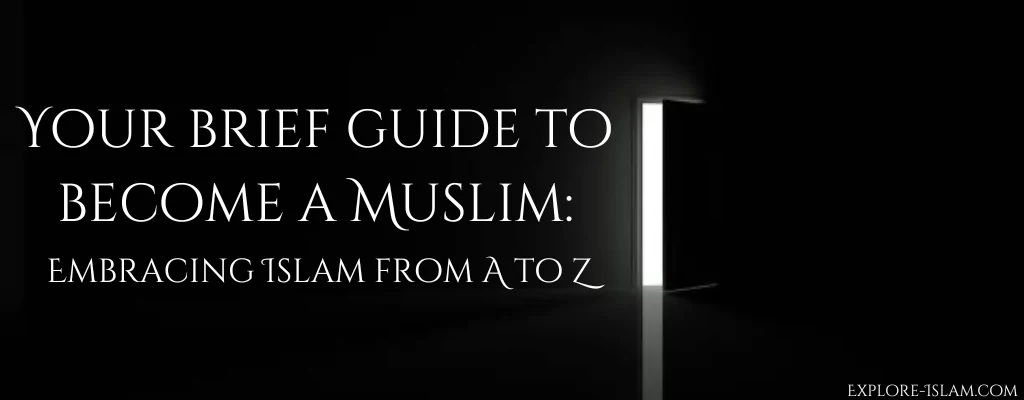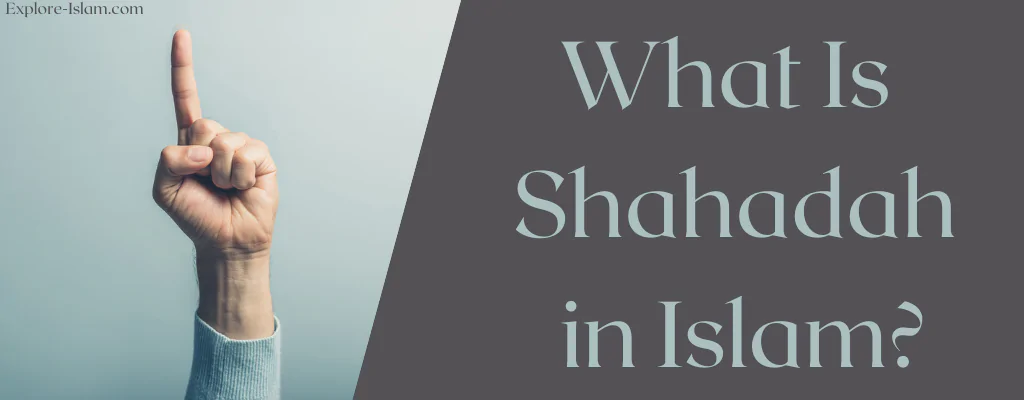Are you thinking about converting to Islam? Congratulations Sister, you are on the right path!
Now, you might be wondering how to convert to Islam as a woman? Here is your complete guide to becoming a Muslim. I have tried to make it as simple and concise as possible for you to follow easily. So, let’s begin!
I understand the mixed feelings you might encounter at the beginning of this journey. Feeling happy, excited, or even confused and overwhelmed is absolutely normal at this stage. However, you should believe deep inside that every effort you spend to become closer to Allah is seen by God and will be rewarded indeed.
Anas (May Allah be pleased with him) reported:
The Prophet (ﷺ) said, “Allah says: ‘ When a slave of Mine draws near to Me a span, I draw near to him a cubit; and if he draws near to Me a cubit, I draw near to him a fathom. And if he comes to Me walking, I go to him running.”‘.
[Al-Bukhari].
How to Convert to Islam as a Woman?
To embrace Islam as a woman, the first step is declaring the Shahada, affirming belief in Allah and His Messenger. This is a personal commitment and does not require witnesses, though it may be done publicly for legal purposes.
While performing ghusl (ritual purification) is recommended, it is not obligatory before taking the Shahada. After accepting Islam, new converts should familiarize themselves with the five pillars: prayer, zakat (charity), fasting in Ramadan, and pilgrimage to Mecca. Reading the Quran deepens faith, providing guidance and peace.
A supportive Muslim community can help a new Muslim woman learn Islamic teachings, including rulings specific to women, such as exemptions from fasting and prayer during menstruation.
Modest dress, including the hijab, is an essential part of Islamic identity, allowing women to maintain dignity while embracing their femininity within permissible boundaries. Islam promotes balance, granting women rights and responsibilities that honor their nature and role in society.
I have summarized the steps of converting to Islam as a woman in the following few points.
1. Say Shahada
The “Shahada” is the first pillar of Islam. It is the declaration that no one is worthy of worship except Allah and that “Muhammad” is his slave and messenger.
Converting to Islam as a woman is very simple. It is something between you and Allah the Almighty and does not require a third person between you. Simply say the Shahada and you are there!
The English transliteration of the shahada is:
“Ash-hadu an la ilaha illa Allah. Wa ash-hadu anna Muhammadan abduhu wa rasuluhu”.
The words of the Shahada mean:
“I Bear Witness, That There Is None Worthy Of Worship Except Allah. And I Bear Witness That Muhammad Is His Slave And Messenger”.
Here is a card with the words of the Shahada and their meanings. Save it on your device for later!

Do I have to Say the Shahada in front of witnesses?
Taking Shahada before witnesses is not essential; since Islam is something between you and your Lord. However, saying the Shahada in front of witnesses for the sake of completing personal documents is allowed but not considered a condition for your Islam to be valid.
See the full fatwa here.
Do I have to Make a Ghusl before Taking the Shahada?
This is an issue of dispute, since there is a few incidents in which one of the companions who wanted to convert to Islam came to the prophet, and the prophet asked them to go, then take a bath and come back.
So, although making ghusl is a recommended thing to do, it is not considered mandatory.
Is Ghusl obligatory before taking the Shahada for a new revert? – Assim al hakeem
2. Learn The 5 Pillars of Islam
The Islamic religion has 5 pillars. These are the fundamental obligations of Allah to all Muslims. Let me introduce you to these 5 pillars in brief.
Shahada: As I previously mentioned, this is your first essential step to becoming a Muslim woman.
Performing Prayers (Salah): Muslims are required to perform 5 daily prayers (Fajr, Dhuhr, Asr, Maghrib, and Ishaa’), before which they do ritual ablution (Wudu’), then face the “Qiblah” in Mecca and start performing a sequence of actions while reciting specific Quranic verses and Dhikr.
Paying Zakat: The third pillar of Islam is paying “Zakat”. Muslims are required to pay 2.5% of their net annual income as charity to the needy.
Fasting Ramadan: Fasting is the fourth pillar of Islam. It is the abstinence from eating, drinking, and sexual intercourse between dawn and sunset.
Muslims are obliged to fast the complete month of Ramadan (the ninth month of the Islamic calendar). Additionally, there are certain days in the year in which fasting is also recommended.
Performing Pilgrimage: Muslims who are physically and economically able are required to do pilgrimage to the city of Mecca (in Saudi Arabia) at least once in a lifetime.

3. Read The Quran
The Quran is the Holy Book of Muslims. Allah’s words that were meticulously preserved by the Muslim Ummah (nation) from the time of their revelation to Prophet Muhammad (Peace and Blessings Be Upon Him), 609 CE up till this moment.
Although Muslims are rewarded for reciting and memorizing the Quran, it is not only considered a spiritual book, but a complete life manual that governs all aspects of life.
Reading the Quran and reflecting on its meanings makes you closer to Allah, provides you tranquility and peace as well as strengthens your faith by providing logic
answers to many questions that might concern you as a new Muslim.
4. Join a Muslim Community For Support
It is advisable for you as a new convert woman to search for a mosque or an Islamic center near your home, where you can find extra support from Muslim sisters there. This will also help you learn more about Islamic practices.
Make sure to dress modestly before you go to the mosque. You will surely be welcome to become a part of the Muslim community and join the educational and social activities there.
5. Learn Islamic Rulings For Females
Women have some special rules in Islam that respect their nature physically, mentally and emotionally.
An example of these rules is that Muslim women are exempt from performing the five daily prayers as well as fasting the day of Ramadan during their menses (However they should make up for the missed fasts after Ramadan).
6. Follow the Islamic Dress Code
Though viewed by Islamophobic media as a sort of oppression of Muslim women, wearing Hijab sets women free from being abused by modern materialistic approaches. It provides you dominance over your body without opposing the innate feminine desire to show your beauty.
In Islam, women are strongly encouraged to be in their full adornment in front of their husbands, and also put on whatever clothes they want in front of Muslim sisters and Mahram men (to whom you are not allowed to get married).
Hijab is all about wearing clothes that cover your entire body. These clothes should not be tight, nor transparent, nor considered an adornment in itself. Being a hijabi woman also entails dealing with respect and modesty with non-mahram men.

Summary
Are you wondering how to convert to islam as a woman? In this guide, we discussed in brief the steps women should follow in order to convert to Islam.
These steps include the declaration of Islam by bearing witness that there is no one worth to be worshiped, except a lot, and that Mohammed, peace and blessings be upon him is his slave and messenger.
The second step is to learn the pillars of islam, which includes the Shadwa performing the five daily prayers Paying the annual charity and fasting the month of Ramadan and recording programs at least once in a lifetime.
The next important step for you as a Muslim convert is to buy the translation of the holy Quran and start reading it and reflecting on its meanings. This will allow you to understand the main Islamic values, provide you tranquility, and strengthen your faith.
Other important steps for women who intend to convert to Islam is to join a Muslim community to find more support on their way, in addition to learning the Islamic rulings for females and following a modest Islamic clothing style.
This short guide is by no means an alternative for seeking in depth Islamic knowledge from trusted Muslim scholars. However, it is a guide that might help you take your first steps towards Islam. May Allah guide us all to what pleases Him.
Explore More!
Do you want to learn more about Islam? Send us a message with any inquiries you might have or sign up for our newsletter for more articles!





